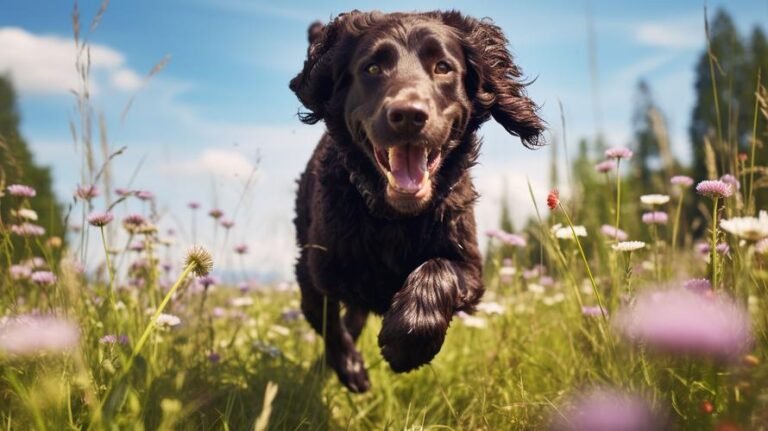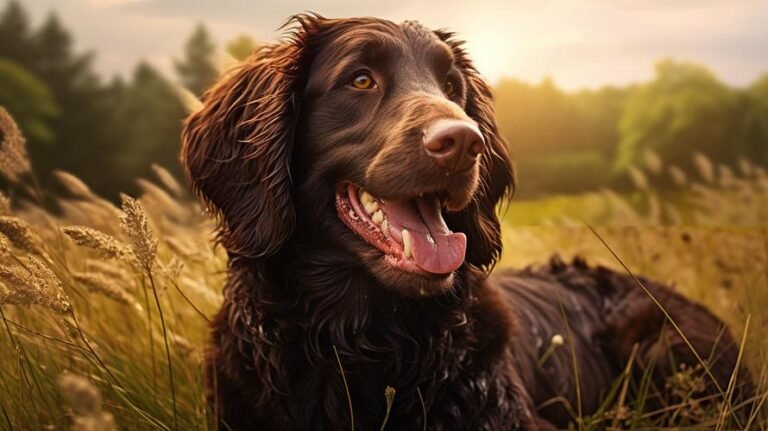Did you know that there’s a canine breed out there that is not just beautiful and brainy, but also one of the healthiest? Meet the Curly-Coated Retriever, a dog breed that’s renowned for its beautiful, curly fur, intelligence, friendly disposition, and robust health profile. With the right care, they can easily live up to 12 years and sometimes even longer. They are also known for their hunting skills and loyalty to their owners. So, if you are planning to adopt one, you are most likely questioning their health status. Well, count yourself lucky today as we unmask everything you need to know about the health of a Curly-Coated Retriever dog!
The Curly Coat, as they are fondly called, are a relatively hearty breed, and they have fewer genetic health conditions compared to many other breeds. However, as with most dog breeds, they do have some potential health issues to watch out for. Let’s dig into what affects these lovely dogs and how to keep them at their healthiest.
Curly-Coated Retrievers, similar to other large breed dogs, are prone to a disease called Hip Dysplasia. This is a condition where the hip joints do not develop properly, causing pain and limping. Thankfully, with proper vet care and health screenings by trusted breeders, the risk of this condition can be significantly diminished.
Eye conditions are also known to affect the breed. One such disorder is Cataracts, which can cause hazy or cloudy vision and eventual blindness if untreated. Regular check-ups with a trusted vet can detect early signs of cataract development, and in many cases, surgery can correct the condition.
Another common health concern for the Curly-Coated Retriever breed is Exercise-Induced Collapse (EIC). Much like it sounds, this condition causes weakness or collapse during or after intense activity. While it’s certainly a scary sounding diagnosis, being aware and informed about it can do wonders for preventing it. If you notice your Curly-Coat excessively panting, stumbling, or appearing disoriented after rigorous exercise or activity, it’s essential to have them evaluated by a vet immediately.
Now that we’ve uncovered the potential Culry-Coat health hazards, let’s dive into some important ways to keep them the healthiest possible.
Firstly, it’s crucial to get your Curly Coats from a beneficial, trusted, and reputable breeder who screens for all these conditions. Reputable breeders can provide health clearances or proof that a dog has been tested for and declared clear of a particular condition, a fundamental aspect to curb inheritance of certain genetic disorders.
Secondly, regular vet check-ups go a long way in keeping your Curly Coat in good health. Apart from helping in the early diagnosis of underlying health issues, routine vet visits can also assist your furry friend to stay up-to-date with vaccinations and regular de-worming.
Lastly, a balanced diet and regular exercise are just as important. Bulldogs, for instance, cannot take long walks due to their short snouts, whereas a Curly Coated Retriever would benefit from a daily walk or swim, given their love for water and endurance. Providing your canine buddy with nutritious food and maintaining a regular exercise regime boosts their immune system and overall health.
In conclusion, is a Curly-Coated Retriever a healthy dog? Absolutely, yes! Just like humans, every breed of dog comes with its own set of potential health problems. However, with the right care, most of these health issues remain potentialities and never become realities.
By being aware of your dog’s potential health challenges, you can help them avoid, overcome or deal with these conditions, ensuring you and your curly Coated Retriever enjoy a long and happy relationship. While the Curly-Coat may not be completely immune to health issues, the good news is that they are not as prone to severe conditions as many other breeds. The key to your dog’s health lies mainly with you. Care for them properly, and they’ll reward you with a healthy, fulfilling companionship that lasts years.



